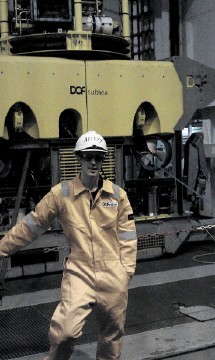
A current shortage of ROV pilot technicians could provide a lucrative and exciting opportunity for a change of career, according to the world’s leading ROV pilot technician training centre, as the demand for skilled workers continues to increase in the global oil and gas industry.
A recent report from the International Marine Contractors Association (IMCA) predicts that there is currently a worldwide shortfall of some 500 personnel in the ROV industry, with an estimated future shortfall of around 2,000 people in the next three to five years.
In response to the surge in demand, The Underwater Centre (TUC) has increased the number of courses it offers in ROV pilot technician training for the current year, and is already filling up courses for 2013. The centre is also looking to expand its current ROV team with new staff in an effort to meet market demand.
Those with any technical aptitude, having experience or knowledge in areas such as electronics, hydraulics or engineering, tend to make ideal candidates for ROV training.
One such graduate is ROV pilot technician Andrew Dickinson, who used to work as a technician for BMW in London and is now based in Aberdeen.
“I decided to go for the ROV pilot technician course and I’m so glad I did as it has paid off big time with the 67% increase I got in wages,” he said.
“The main things that attracted me to the subsea sector were money and time off. It is amazing how easily you can fill up a month at home. The majority of my family and friends live in London and my fiancée’s family live all around Scotland, so I spend a lot of time travelling.
“I was also attracted by the different aspects of the job; the electrical, mechanical, hydraulics and skills to be learned, plus the physical and mental challenges. Everyday there is something different to be done; I love how it makes me think and it has a lot of rewarding moments.
“I wouldn’t have got the job I have without the training at The Underwater Centre. I was applying to jobs in ROV for a year and half before I did the course. After completing the course I got a job in one week. It gave me the basics to get started and the flying experience I needed, so I wouldn’t be as nervous the first time I piloted an £8million class three vehicle. But that was just the start, so much learning has happened since I started my job and I still have plenty to learn.”
General manager at the centre Steve Ham said that those with experience in other industries can easily transfer those skills to develop a new career in the oil and gas sector.
He said: “As well as learning how to pilot an ROV, a great deal of the role of ROV pilot technical is about the repair and maintenance of ROV systems, so our courses take existing technical knowledge and apply it to ROVs.
“Those with an interest or background in electronics, hydraulics or engineering are well suited to the role; whether that’s having spent years maintaining outboard engines, or having a degree in engineering, our courses cater for all levels of technical capabilities, giving graduates a foot in the door of the industry.
“ROVs are playing an increasingly important role in the industry as oil and gas companies now need to drill at ever greater depths to extract hydrocarbons and this year, in particular, has seen an increase in demand by industry for well-trained ROV pilot technicians, as can be seen in the recent figures from IMCA.
“We have responded by increasing the number of courses we offer at the centre, and we have been working very closely with the subsea industry to ensure that our courses train candidates to the standard required by industry.
“The ROV industry provides an excellent career choice, with benefits including job satisfaction, lucrative earnings and worldwide travel, and our courses attract students from across the globe. The overall average time for our students to find work is less than three months; however, this year we have seen that time shorten dramatically, with some students working within a week of graduating.”
Based at Fort William in the west Highlands, The Underwater Centre’s in-depth training programmes comprise four weeks of electronics modules and three weeks’ training in ROV operations, including repair and maintenance, and flying live ROVs in the open-water tidal waters of Loch Linnhe.
Those with a particularly strong technical background may be able to progress straight to the three-week ROV pilot technician course. The centre has a set up similar to that of offshore, with ROV control cabins, launch and recovery systems and a dedicated engineering and electronic workshop. Trainees also train alongside the centre’s commercial diving students, preparing them for working with divers on real jobs.
o Anyone interested in more information about The Underwater Centre should telephone 01397 703 786 or e-mail info@theunderwatercentre.co.uk